Japan: A cooking class on Ishigaki Island
Tamako is an old lady who lives on the Japanese Ishigaki Island, in the Okinawa prefecture – an area renowned for the longevity of its residents. A spritely 90 years old, Tamako’s lively spirit proves infectious for visitors to her kitchen.
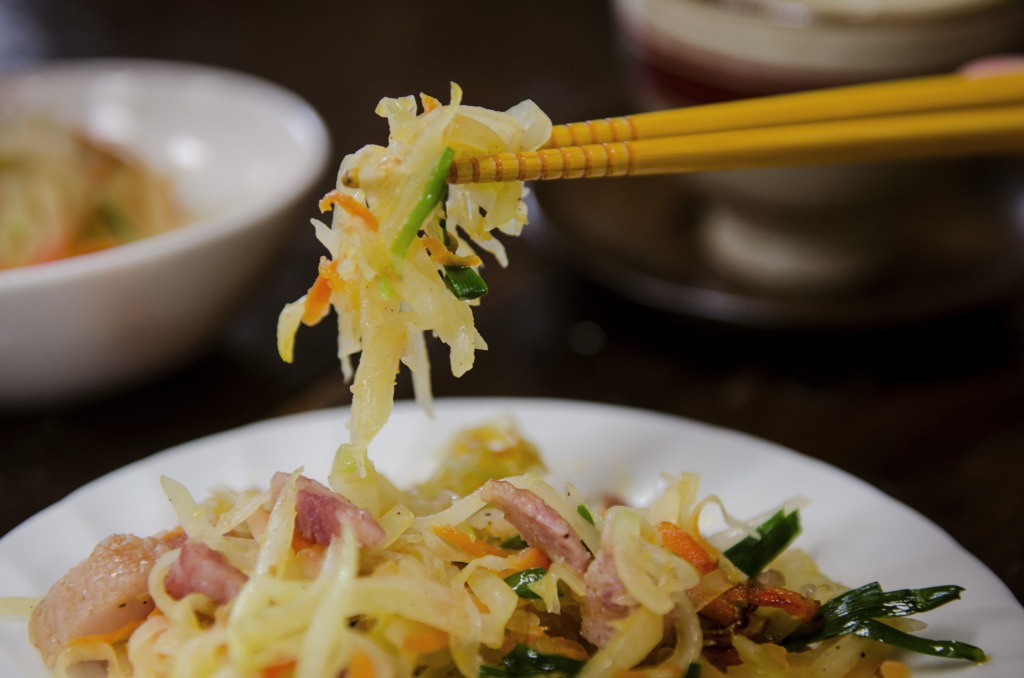
Bright green may not be the first colour one associates with Japan. Unless, of course, one has experienced those drenching monsoon rainstorms, which transform the trees, fields and meadows into a glowing melange of apple-greens, set against the impassive grey of the heavens above. Then, one will forever associate that colour with Japan. And recall the joy of tramping through the dampness of nature, far away from the bustling metropolises of Tokyo or Osaka.
Ishigaki Island is the commercial hub of the Yaeyama Islands, located near to Taiwan in the East China Sea. Arguably the island’s best view can be enjoyed from the peak of its mountain, the 526m high Omoto-dake. Somewhere up there, we had heard, the old lady called Tamako lived. ‘Turn left off the main street’, passers-by in the valley below had told us. And yet once we had made our ascent, the search for Tamako seemed much less straightforward. Just a single street passes through Ishigaki Island, but countless small lanes trail off from it on either side, none of which appear to be named. And even if they had been named, their titles would have proven illegible anyway, to anyone unfamiliar with the Japanese script. And so we continued on in search of Tamako, as though lost in a sort of enchanted maze.
Tamako’s home: Die Marutaka Nouen Farm
Finally, partly concealed behind an entanglement of ivy, the word ‘Farming’ was just about visible. The sign, lightly rusted, hung there at a jaunty angle. This must be it, the Marutaka Nouen Farm. A dirt path led to a small car park in front of the fields. Welcoming calls emanated from inside a nearby building, which resembled a sort of greenhouse. The moment we had parked the car, the rain disappeared. Just the uniform grey of the sky remained. A lovely lady scrambled out of the house, full of ebullient greetings. We bowed politely, smiling in response, and were lead straight into the waiting greenhouse.
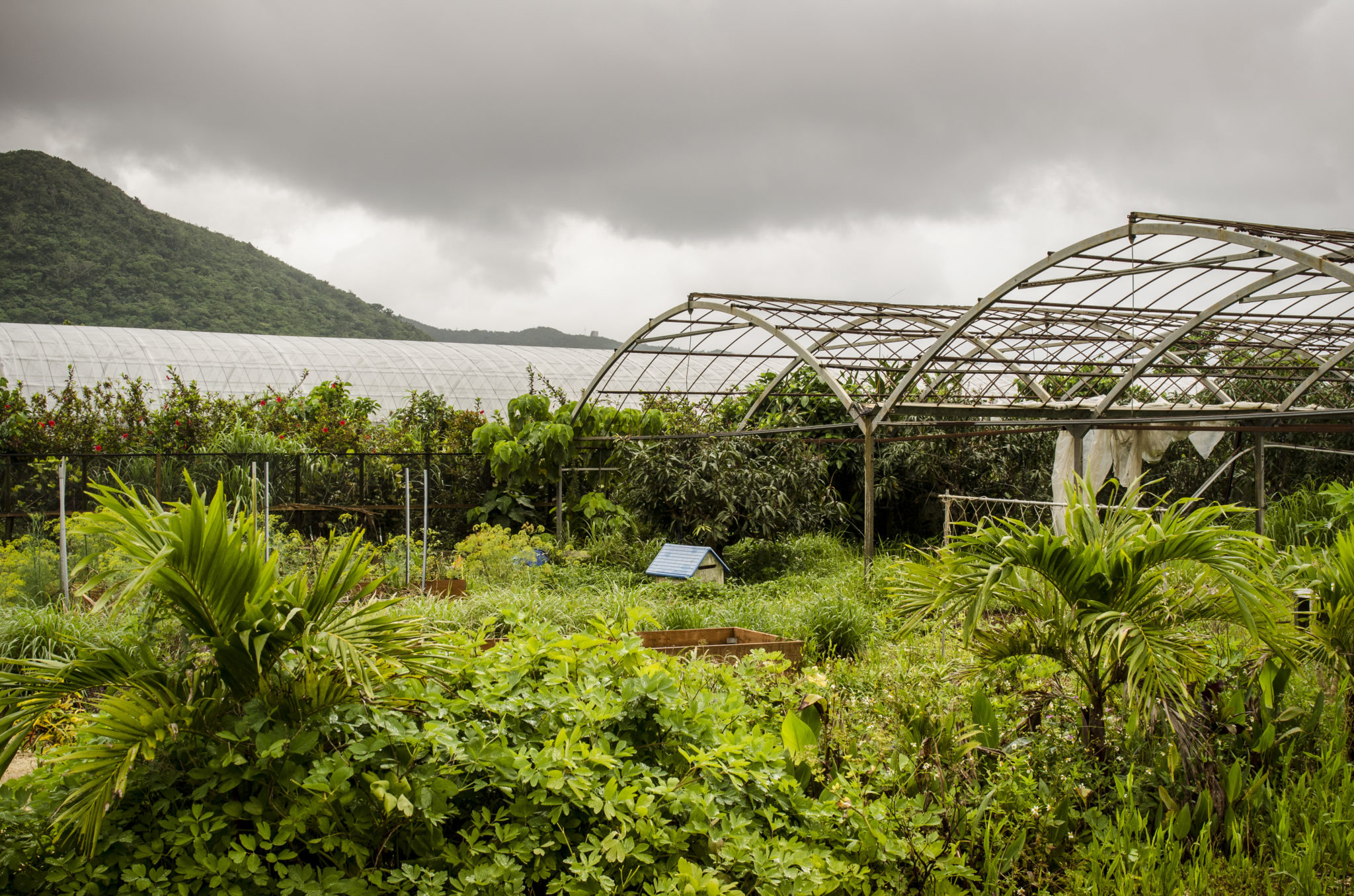
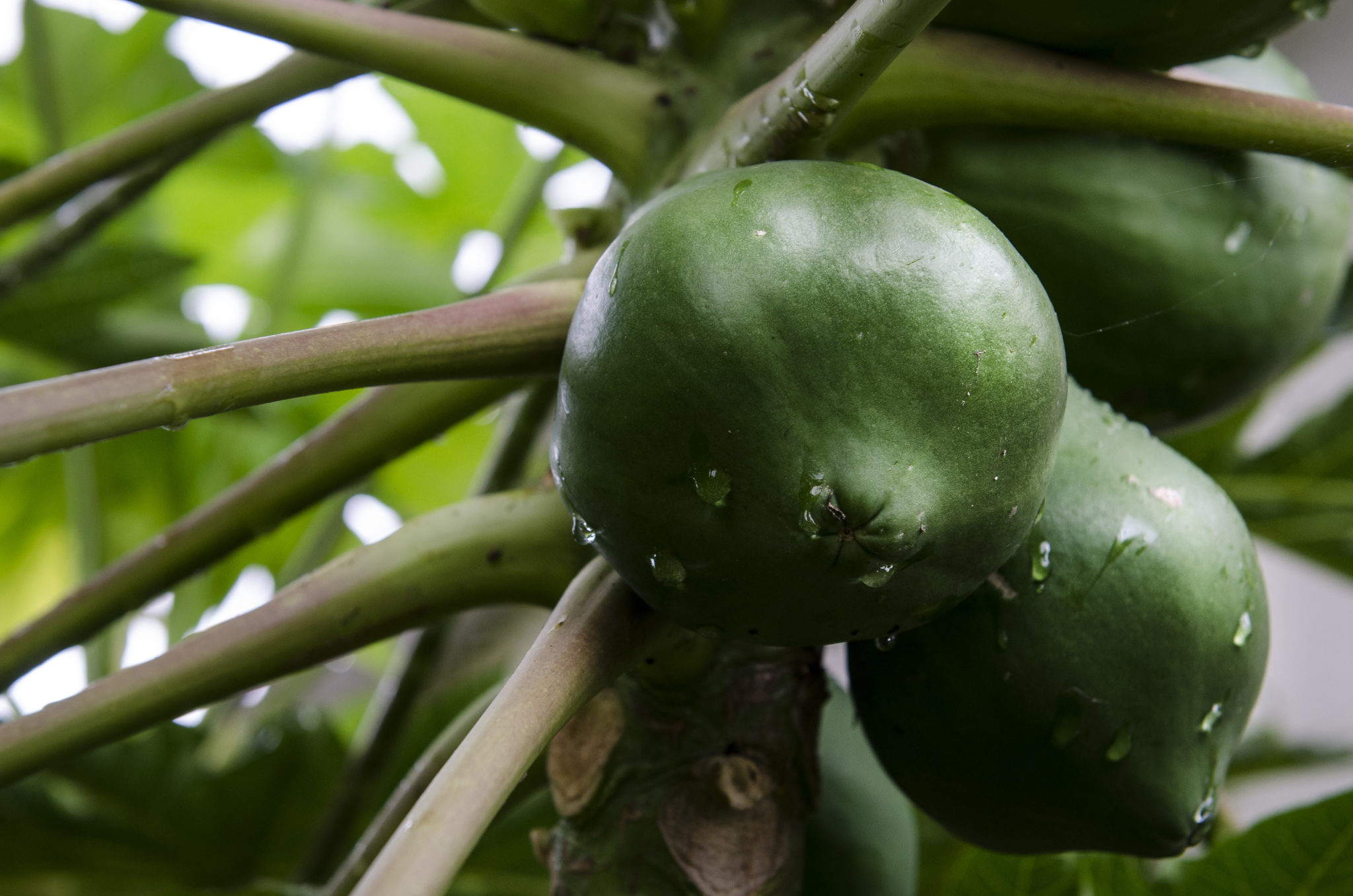
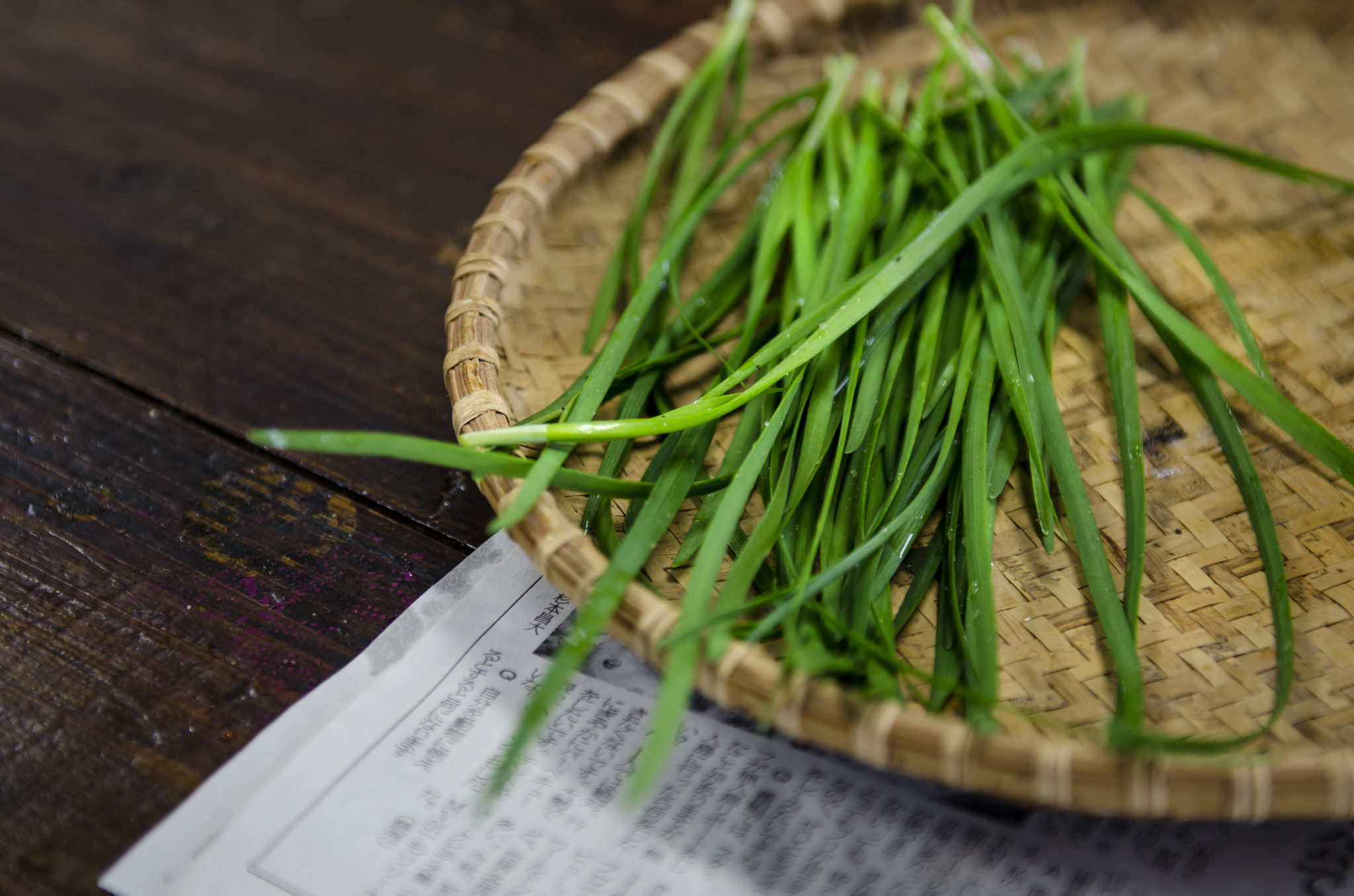
We soon established that this wasn’t actually a greenhouse at all, but rather, Tamako’s kitchen. Here, our sprightly nonagenarian host eased her way through her domain – a cheerful smile playing upon on her face. On her head she wore a colourful scarf, alive with an assortment of plants and animals, as brightly coloured as the plants in her own garden.
Tamako has little time for small talk. Instead, she grabs her slippers, tosses a couple of pairs to her guests, grabs a cane basket and a large knife and marched purposefully out into the garden. She clearly knows it inside-out. Little wonder, as she once hid amongst the plants here as a small child, whilst her grandparents sat at the big table inside, eating their own vegetables from a selection of little ceramic bowls.
Today, the property belongs to Tamako alone. She no longer plays hide-and-seek in the vegetable patch, but instead, tends to her own, ever-fresh supermarket of ingredients. The garden teams with papaya, herbs, beans and an array of other plants which the average European would no doubt struggle to name. Day in, day out, the little old lady tends to her garden. She weeds, nurtures, harvests and cooks and shares this process in turn with her visitors – all are welcome here.
Today there are papayas to be harvested. Big, gorgeous papayas. Not the bland, undersized little fruits we sometimes see, which are little more than an expensive garnish to a fruit salad. And with that, Tamako has everything that she needs and makes her swiftly way back into the kitchen.
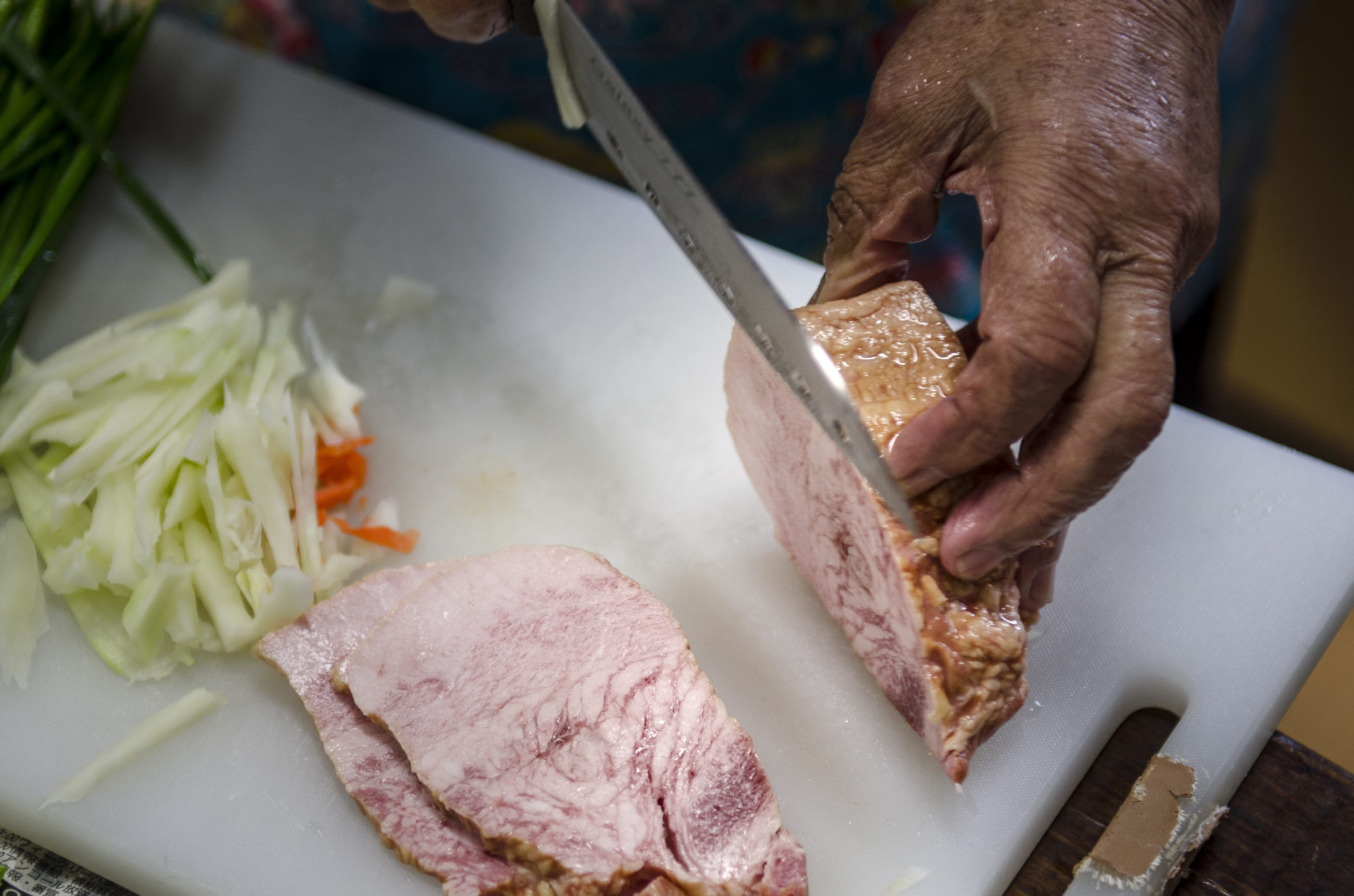
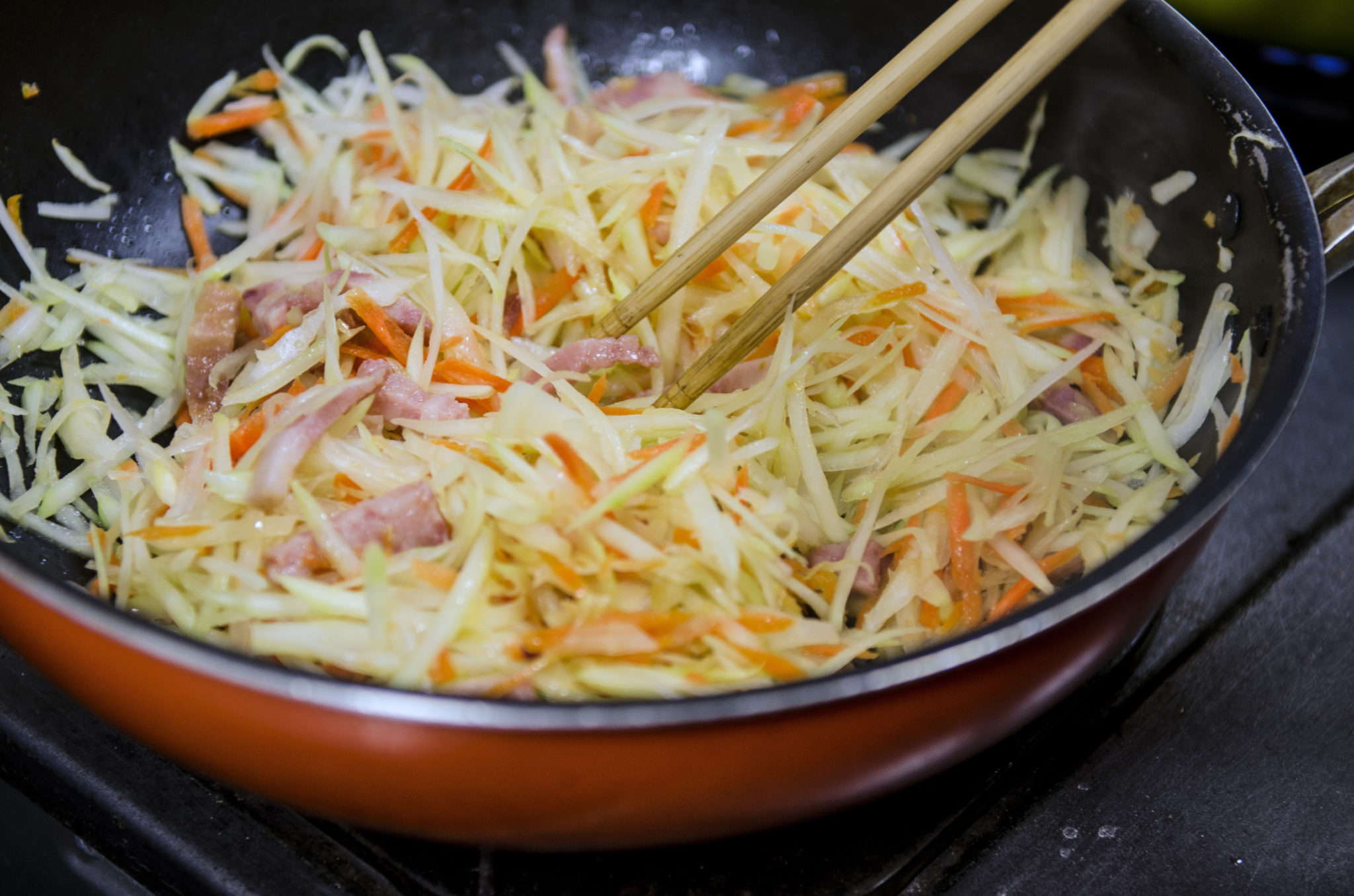
Tamako’s good health at such an advanced age is hardly a coincidence. In this part of Japan’s Okinawa prefecture, there are many, many people aged well into their 90’s and even in their 100’s. The secret to this generalised longevity has yet to be completely established. In Tamako’s case, however, it lies surely in the fulfilment of so many daily tasks, the devotion to her garden and in those regular interactions with other people, whom she welcomes into her home on an almost daily basis. Tamako barely has time to grow old: if Okinawa is the Archipelago of the Ancients, she is its most charming example. Now each guest receives an apron, a board and a knife. And then it begins.
From A to Z: When Tamako cooks, she does everything herself
Anyone who finds themselves in Tamako’s kitchen will be encouraged to cook with her, and here that means a lot of slicing, grating and tossing. Rather a lot of talking goes on too, but none of it in English. Tamako doesn’t speak any English, but then she really doesn’t need to. For those standing beside her, a glance into the old lady’s friendly face, so full of wisdom and experience, suffices to tell its own story. And any essential instructions can always be translated by Tamako‘s daughter. Tamako likes her food spicy, so the tang of her home-grown pepper is rarely missing from any dish. The kitchen bustles, the old lady laughs, the ice has been long since broken. The kitchen is the heart of Tamako’s home. Everything is here: a number of benches, a long wooden table and an exquisite sideboard with the most beautiful Japanese ceramics. The actual cooking area, however, is quite simply equipped: just two gas hobs rest above a shelf containing an array of Woks. This is all she needs. She has all the essentials to make a meal truly special.
Tamako has already prepared the ingredients herself. In glasses und bottles assembled behind the stove and along the sink, she has oils, vinegars, sauces and spices. Some of them she also sells: the recipes a closely-guarded secret.
The papaya, which until today had been hanging happily from a big tree beside the entrance, has been grated and is now sizzling in a Wok. Tamako is out in her Garden again. A few minutes later she returns, her basket filled with fresh lemongrass, mint and ginger, and their aroma fills the entire room. Then there is tea. Tamako is grinning so much now, you could be forgiven for thinking she was up to something. But it is merely a sign of the immense joy that this elderly lady draws from her everyday life.
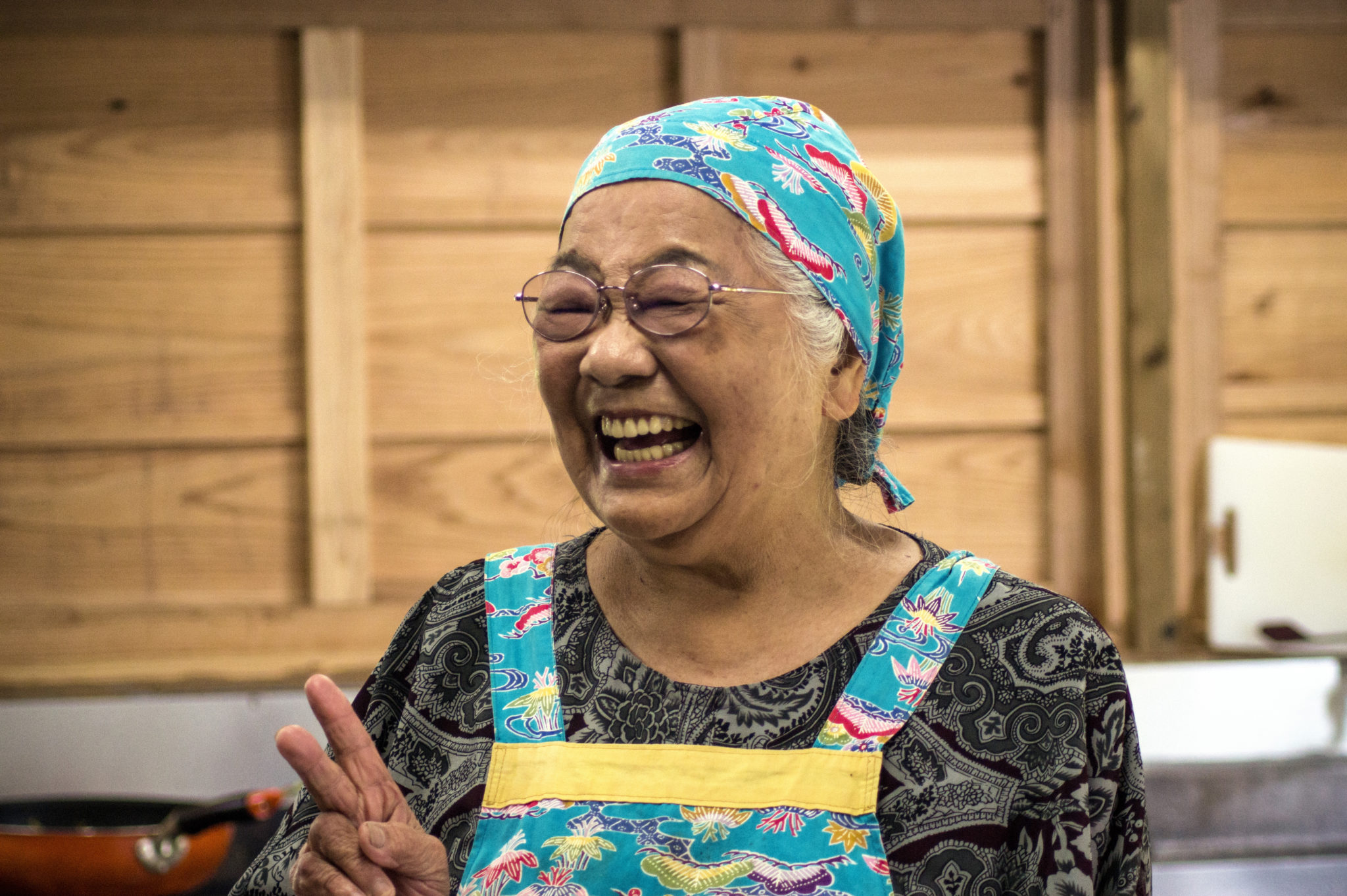
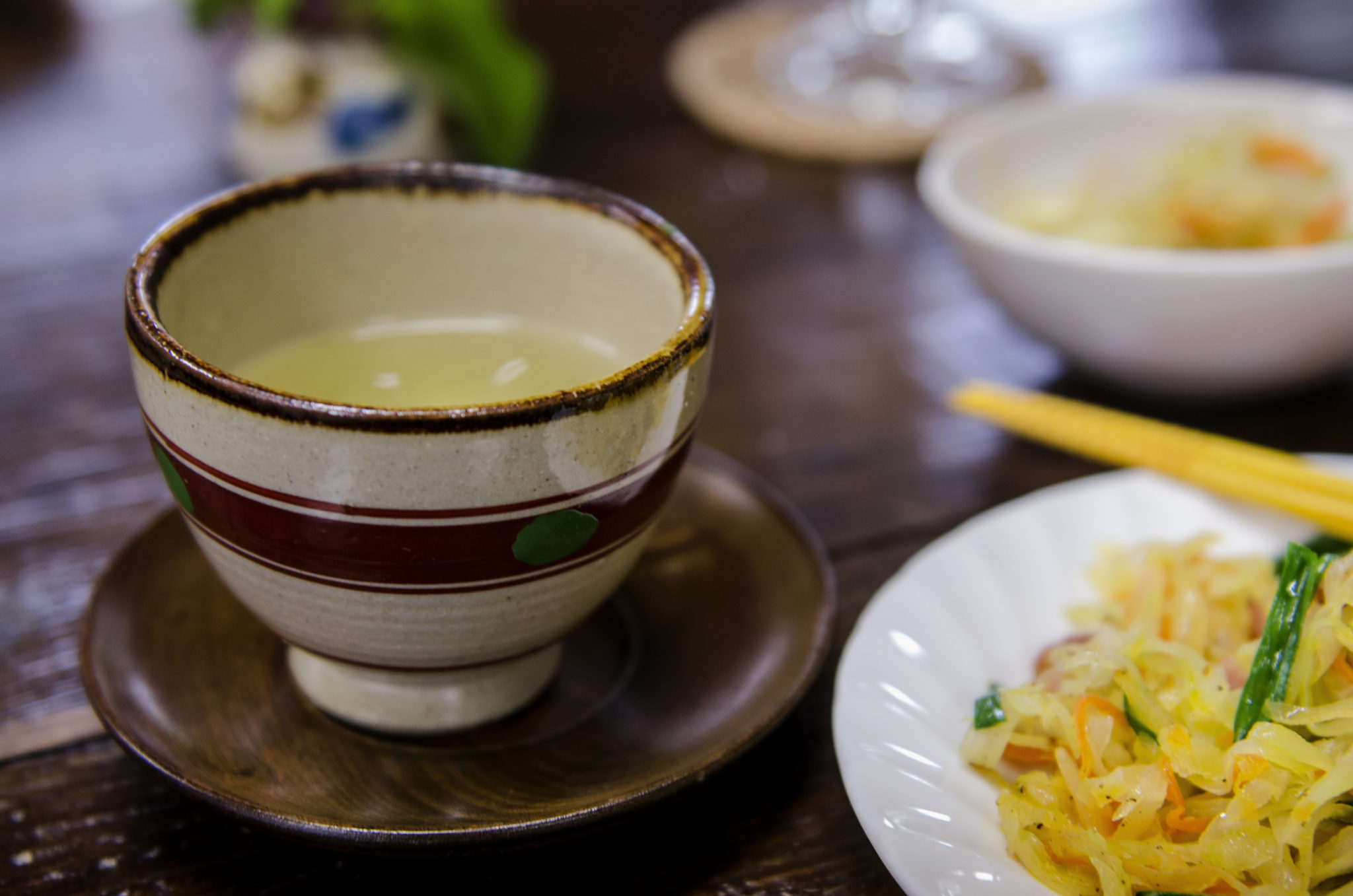
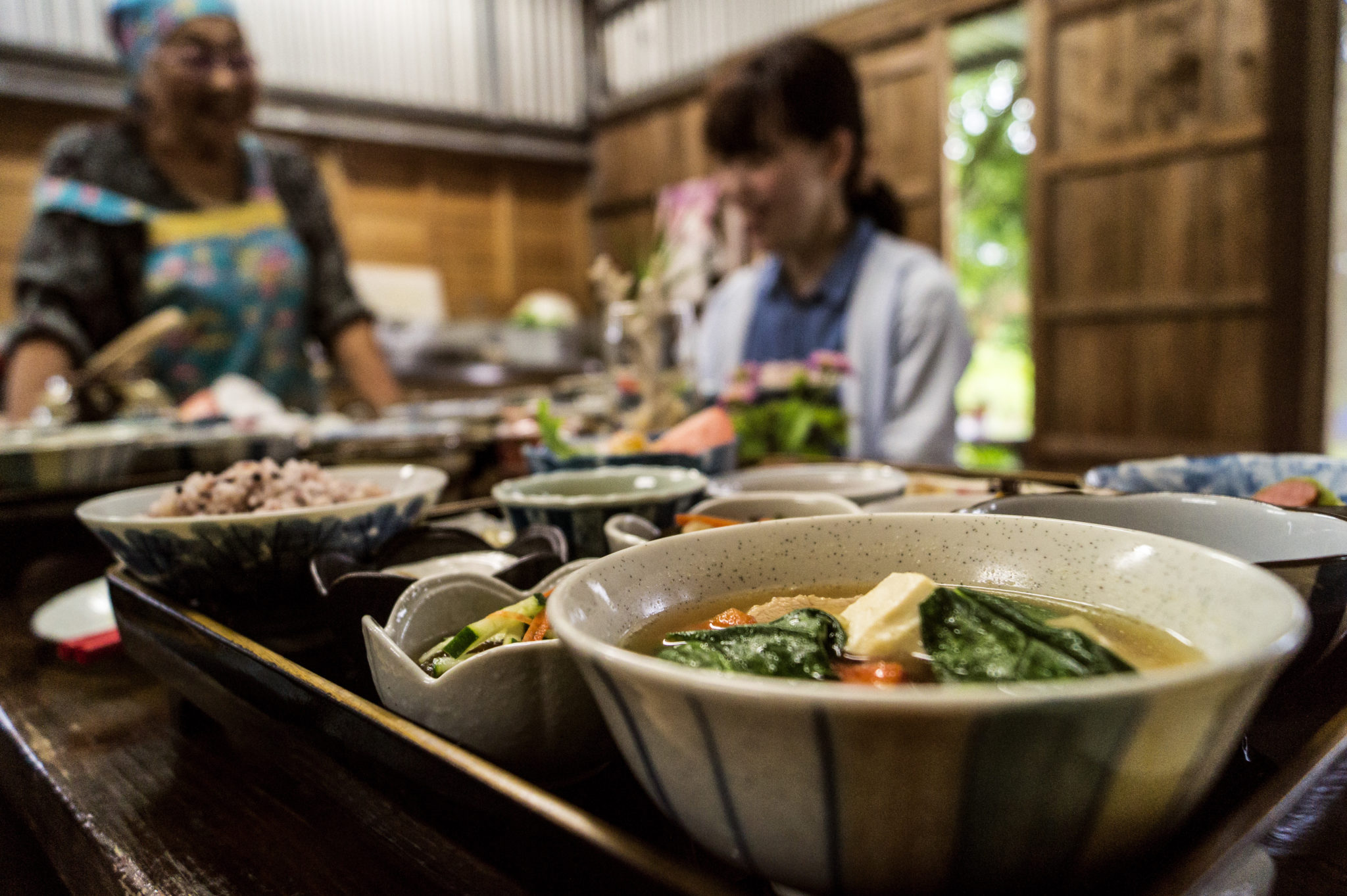
The papaya is quickly tasted and dispensed into small, ornately decorated bowls, assembled on the long table. Outside, the rain is falling again. It doesn’t matter. As the large drops pound against a corrugated iron roof, it merely adds to the atmosphere. Outside the rain, inside the warmth, which triumphs despite open windows and missing walls. Tamako glances around. A scrutinising look, ensuring that all is well with the dishes and the guests. Yes, it tastes just right. In no time at all, the bowls are completely emptied and Tamako smiles contentedly, but we are still far from finished.
The lady of the house and her daughter disappear into a back room and return a short while later with a huge tray filled with Japanese specialties. Dishes, the preparation of which could never be squeezed within a two hour cookery course, appeared now, beautifully presented on the ancient tray. Tamako explained each in turn: pickled seaweed, fish, beef soup, vegetables, salad und many other delicasies, some of them so obscure, that no adequate translation for them was possible. Charmingly, Tamako clapped her hands with satisfaction and stumbling slightly over the words, commanded ‘Please eat!’ to the room, in English. The gentle clicking of the chopsticks between bites sounded around the room. Otherwise, it was peaceful, with that companionable sort of silence one seldom encounters. The sort of stillness which doesn’t feel uncomfortable, even after 10 minutes or more has passed. The sort of peace which is rarely to be found in the world’s big metropolis’, but which, in Japan, is seemingly there behind every door. In Tamako’s kitchen it is always in evidence. Little wonder, that she possesses so much energy and joy.
Along with the last of the raindrops, the final dish on the table is emptied. Then, with a long, low bow to her apprentices, our cookery instructor offers her thanks. We can only hope to take some of her joie de vivre away with us. One after the other, her visitors’ cars retreat from the parking area and disappear around the corner and out into the street. Only Tamako remains, laughing and waving – with a bright green scarf in her hand.




No comments yet.
Be the first to comment on this post!